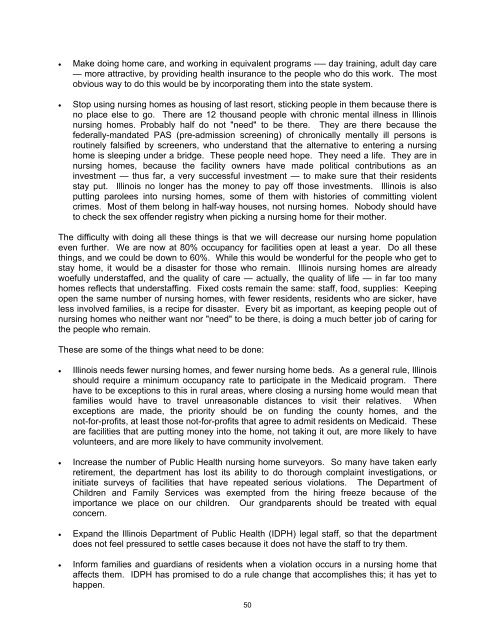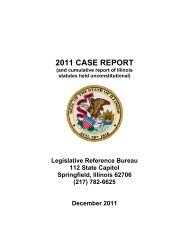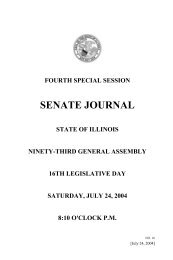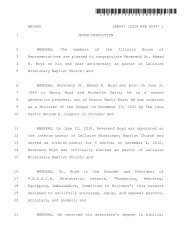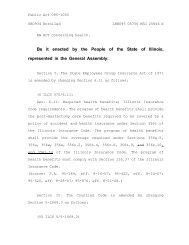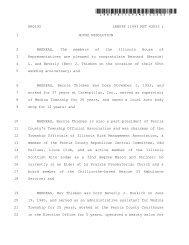Long-Term Care - Illinois General Assembly
Long-Term Care - Illinois General Assembly
Long-Term Care - Illinois General Assembly
Create successful ePaper yourself
Turn your PDF publications into a flip-book with our unique Google optimized e-Paper software.
• Make doing home care, and working in equivalent programs -— day training, adult day care<br />
— more attractive, by providing health insurance to the people who do this work. The most<br />
obvious way to do this would be by incorporating them into the state system.<br />
• Stop using nursing homes as housing of last resort, sticking people in them because there is<br />
no place else to go. There are 12 thousand people with chronic mental illness in <strong>Illinois</strong><br />
nursing homes. Probably half do not "need" to be there. They are there because the<br />
federally-mandated PAS (pre-admission screening) of chronically mentally ill persons is<br />
routinely falsified by screeners, who understand that the alternative to entering a nursing<br />
home is sleeping under a bridge. These people need hope. They need a life. They are in<br />
nursing homes, because the facility owners have made political contributions as an<br />
investment — thus far, a very successful investment — to make sure that their residents<br />
stay put. <strong>Illinois</strong> no longer has the money to pay off those investments. <strong>Illinois</strong> is also<br />
putting parolees into nursing homes, some of them with histories of committing violent<br />
crimes. Most of them belong in half-way houses, not nursing homes. Nobody should have<br />
to check the sex offender registry when picking a nursing home for their mother.<br />
The difficulty with doing all these things is that we will decrease our nursing home population<br />
even further. We are now at 80% occupancy for facilities open at least a year. Do all these<br />
things, and we could be down to 60%. While this would be wonderful for the people who get to<br />
stay home, it would be a disaster for those who remain. <strong>Illinois</strong> nursing homes are already<br />
woefully understaffed, and the quality of care — actually, the quality of life — in far too many<br />
homes reflects that understaffing. Fixed costs remain the same: staff, food, supplies: Keeping<br />
open the same number of nursing homes, with fewer residents, residents who are sicker, have<br />
less involved families, is a recipe for disaster. Every bit as important, as keeping people out of<br />
nursing homes who neither want nor "need" to be there, is doing a much better job of caring for<br />
the people who remain.<br />
These are some of the things what need to be done:<br />
• <strong>Illinois</strong> needs fewer nursing homes, and fewer nursing home beds. As a general rule, <strong>Illinois</strong><br />
should require a minimum occupancy rate to participate in the Medicaid program. There<br />
have to be exceptions to this in rural areas, where closing a nursing home would mean that<br />
families would have to travel unreasonable distances to visit their relatives. When<br />
exceptions are made, the priority should be on funding the county homes, and the<br />
not-for-profits, at least those not-for-profits that agree to admit residents on Medicaid. These<br />
are facilities that are putting money into the home, not taking it out, are more likely to have<br />
volunteers, and are more likely to have community involvement.<br />
• Increase the number of Public Health nursing home surveyors. So many have taken early<br />
retirement, the department has lost its ability to do thorough complaint investigations, or<br />
initiate surveys of facilities that have repeated serious violations. The Department of<br />
Children and Family Services was exempted from the hiring freeze because of the<br />
importance we place on our children. Our grandparents should be treated with equal<br />
concern.<br />
• Expand the <strong>Illinois</strong> Department of Public Health (IDPH) legal staff, so that the department<br />
does not feel pressured to settle cases because it does not have the staff to try them.<br />
• Inform families and guardians of residents when a violation occurs in a nursing home that<br />
affects them. IDPH has promised to do a rule change that accomplishes this; it has yet to<br />
happen.<br />
50


